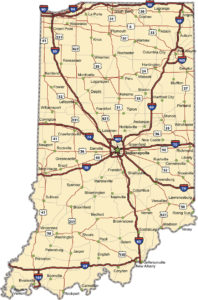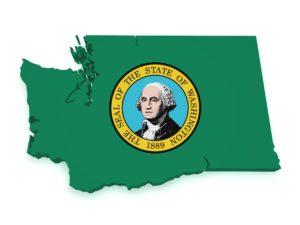As 2017 comes to a close, we thought this would be a good time to reflect on the past year. There have been quite a few notable developments in the online sales tax realm and in multistate issues in general over the last 12 months. Here are 8 developments that we thought were of particular significance, which we’ve discussed on our blog in the past year.
1. Fascinating Ramifications of Colorado’s New Online Sales Tax

Colorado has been at the forefront of the internet sales tax debate since 2010, when it passed a law that required companies with more than $100,000 in sales that did not have nexus in the state to 1) alert Colorado customers that state sales or use tax is due and 2) file annual reports to the state, listing all the names, purchases and shipping addresses of Colorado customers.
After making its way to the courts and several rounds of negotiations between the state and taxpayers, the law went into effect on July 1, 2017. Find out why the U.S. Supreme Court chose not to hear the case and more in the full blog post.
2. Another Move Toward Economic Nexus

When businesses sell their products across state lines, they need to think about whether they have taxable presence, or nexus, in the state and if their products are taxable. In 2017, several states began pushing the boundaries of defining the physical presence in order to generate more revenue. Welcome to the concept of “economic nexus.”
Read more about this concept and how states such as Indiana are pushing limits through economic nexus in this blog post.
3. What’s New In Massachusetts? An Online Sales Tax Update

Although Massachusetts’ Directive 17-1 was very quickly pulled back by the state, it was so distinctive that it’s worth noting in our list of biggest online sales tax news from the year. Why? It redefined nexus, twisting established precedent to justify collecting sales tax from internet vendors. The most interesting part of this directive, however, is the detailed discussion and justification accompanying it, contorting previous precedent and state law to increase the number of online retailers responsible for charging customers for state sales tax.
Read more about it in this blog post.
4. Amnesty Program Directed at FBA Sellers

On Monday, July 31, the nexus committee of the Multistate Tax Commission (MTC) approved the MTC to participate in a multistate sales tax amnesty program for third-party sellers whose only nexus with a state is the use of fulfillment services offered by third-party marketplaces. This voluntary disclosure program offered online marketplace sellers a chance to come forward if they hadn’t been collecting, and remitting taxes (sales/use and income/franchise tax) in states where they should have. Even though the program ended in November, the type of amnesty was unprecedented, so we felt it should be noted in our year-end review.
Read more about the amnesty program in this blog post about it.
5. How Did Washington Expand Nexus? The Latest State Tax Legislation

Over the last few years, Washington has taken an interesting approach to its nexus and state tax law. Back in July, the state’s Department of Revenue (DOR) enacted another piece of legislation that affected economic nexus: HB 2163. This House Bill extended Washington’s economic nexus standard in retailing activity that met the bill’s defined thresholds.
Read more about Washington’s HB 2163 in this blog post.
6. Reminder to California Manufacturers: Sales Tax Exemption!

In September we reminded businesses about this useful partial exemption available to manufacturing companies. It allows certain manufacturers and biotech companies to exempt a portion of California sales and use tax on purchases of qualified equipment used in manufacturing and R&D (research and development). While it originally went into effect July 1, 2014, this past fall the California Governor extended it beyond its original end date of 2022, to be available until 2030.
Read more about the bill and additional companies that were eligible for the exemption as of this year in our blog post about it.
7. New: Online Sales Tax Bill Defeated in South Dakota Supreme Court

Back in 2016, South Dakota passed an economic nexus statute mandating a sales tax collection responsibility from sellers grossing over $100,000 in sales to the state’s customers, or transactions numbering more than 200 in a year – even if the seller has no physical presence or other connection with the state. Unsurprisingly, South Dakota’s Supreme Court ruled Senate Bill 106 to be unconstitutional. However, the ruling did give the state a case they could appeal to the U.S. Supreme Court. Now we eagerly wait to see whether the high court will hear the case in 2018.
Read more about the bill and the ruling in this blog post.
8. South Carolina to Amazon: Collect Sales Tax Now

South Carolina recently filed a motion in court to force Amazon to collect these taxes and fees on behalf of its third-party sellers. The state is claiming it could lose more than $500 million in sales tax if Amazon doesn’t begin collecting them now, and is asking the court to require the retailer to charge sales tax and put it into a trust or escrow-type account until the case is settled.
Read more about the motion filed by South Carolina, as well as our thoughts on it, in this blog post.
Would you add any online sales tax issues from the past year to our list? Please also let us know if you have any questions about how online sales tax may affect your business! And stay tuned for continued interesting news from the states in 2018, as they all seek to increase compliance and collection efforts.
Miles Consulting Group, Inc. is a professional service firm in San Jose, California specializing in multi-state tax solutions. Our firm addresses state and local tax issues for our clients, including general state tax consulting, nexus reviews, tax credit and tax incentive maximization, income tax and sales/use tax planning and other special projects. To learn more, contact us today at www.MilesConsultingGroup.com.


















